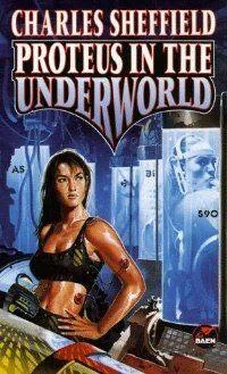Charles Sheffield - Proteus in the Underworld
Здесь есть возможность читать онлайн «Charles Sheffield - Proteus in the Underworld» весь текст электронной книги совершенно бесплатно (целиком полную версию без сокращений). В некоторых случаях можно слушать аудио, скачать через торрент в формате fb2 и присутствует краткое содержание. Год выпуска: 1995, ISBN: 1995, Издательство: Baen Books, Жанр: Фантастика и фэнтези, на английском языке. Описание произведения, (предисловие) а так же отзывы посетителей доступны на портале библиотеки ЛибКат.
- Название:Proteus in the Underworld
- Автор:
- Издательство:Baen Books
- Жанр:
- Год:1995
- ISBN:0-671-87659-7
- Рейтинг книги:3 / 5. Голосов: 1
-
Избранное:Добавить в избранное
- Отзывы:
-
Ваша оценка:
- 60
- 1
- 2
- 3
- 4
- 5
Proteus in the Underworld: краткое содержание, описание и аннотация
Предлагаем к чтению аннотацию, описание, краткое содержание или предисловие (зависит от того, что написал сам автор книги «Proteus in the Underworld»). Если вы не нашли необходимую информацию о книге — напишите в комментариях, мы постараемся отыскать её.
Proteus in the Underworld — читать онлайн бесплатно полную книгу (весь текст) целиком
Ниже представлен текст книги, разбитый по страницам. Система сохранения места последней прочитанной страницы, позволяет с удобством читать онлайн бесплатно книгу «Proteus in the Underworld», без необходимости каждый раз заново искать на чём Вы остановились. Поставьте закладку, и сможете в любой момент перейти на страницу, на которой закончили чтение.
Интервал:
Закладка:
Was it as cold in here as it felt? Was the air as thin as it seemed when it entered her straining lungs? And where were the Fugates?
They had left her to work, but surely they must wonder why she had not asked for food, not called them, not said how she was doing or when she was likely to come out. They did not know of her determination to keep at it non-stop until she was finished.
She went over to her suit and checked its monitors. Temperature in the room, close to freezing. Air pressure, less than half a standard Earth atmosphere. At some time while she was working it had dropped, so slowly that she had not been aware of the change. It was still dropping.
She moved over to the chamber door-cautiously, because any exertion left her dizzy and panting. The great door was sealed, and she could see no way to open it. She realized for the first time that the room had no way of communicating with the outside.
Even if the Fugate colonists who had brought her did not return, surely some others would come here soon.
But why should they? There were no babies in these tanks. The humanity tests were being conducted elsewhere.
She went again to the door and hammered on it as hard as she could. She listened. There was no sound but her own breath, rasping in her throat.
She returned to her suit and eased her way into it. As the seals closed, the internal air pressure began to move back to normal suit ambient, slowly enough so that she did not suffer compression effects. Her head cleared, and she had the welcome feeling of pins and needles in her chilled hands and feet.
Sondra sat down at the control station for a form-change tank and inspected her suit monitors. When she came to the colony she had been advised to remain in her suit as long as she was here. That had seemed easy enough to do—provided that she could replenish her air and power supplies as often as necessary.
Which was no longer a good working assumption.
Power would not be a problem. The suit’s heating unit was more than adequate. It would keep her body warm, long after she ran out of air. That would happen in six hours, unless someone came or she could find a way to escape. Maybe she could stretch her time to as much as eight hours if she sat very still. First, though, she would have to stop trembling; and her shivers inside the warm suit had nothing to do with outside cold. She glanced again at the suit monitors.
Air pressure in the room, one tenth of a standard atmosphere—and falling. Temperature, thirty degrees below freezing.
She could not rely on any Fugate appearing to save her in the next few hours, not when they had been happy to ignore her for the past eighteen. She had to find a way to escape. How? Her mind felt drained, empty, sluggish, unable to produce a useful thought of any land.
Bey Wolf’s assessment of her to Robert Capman had been accurate: not much above average intelligence. If he could see her now, he would offer a far harsher opinion. Sondra leaned forward, put her weary head down on the flat surface of the tank’s control station, and closed her eyes.
CHAPTER 14
Sondra, deep within the Fugate Colony in the far-off reaches of the Kuiper Belt, was convinced that Bey Wolf regarded her as an idiot. It might have comforted her a little to know that Bey, standing on the surface of Mars, had at the moment no better opinion of himself.
What he had just done might be natural for someone recently arrived from Cloudland. It was inexcusable in a man who had spent most of his life on the turning globe of Earth.
The deep caverns of Old Mars possessed an oddly timeless quality. Temperature was held constant, air pressure at any particular level did not vary. Lighting levels, generated from internal power sources deep within the planet, remained steady. Any significant report or picture that came to Earth from Mars provided as a background an unchanging interior environment. Bey, wandering within the caverns, had accepted the same mental mindset of an unvarying world.
It was a huge shock to ride the spiral escalator up to the surface, and to discover in the final hundred meters that he was arriving during the Martian night Bey stood on the frozen surface and stared about him. This was what happened when you did something without bothering to think. He had no idea of the local surface time. Dawn might be minutes away, or a full twelve hours. He had plenty of power and air in his suit, but he was not prepared to stand like a fool for half a day.
He glanced up. Although the atmosphere of Mars was gradually becoming more dense as a result of the terraforming work, it was still negligible by Earth standards. The stars were brilliant and unwinking. The constellations held their familiar patterns, unchanged from the skies of Earth.
Bey identified the Big Dipper and Polaris. He turned to face them. That was Martian north. Actually, approximately north, because the Mars polar axis, like Earth’s own polar axis, processed around an axis normal to the plane of the ecliptic. Bey could not recall the current Martian pole star. Polaris would have to do.
If that was roughly north, then that must be east. Bey stared off to his right. He was hoping to catch the first glint of light signaling that dawn was on its way. He was disappointed. The eastern sky was dark; but in it, hovering close to the horizon like a hanging jewel, shone a bright point of blue-white light.
It was Earth, which with Venus formed twin Morning Stars of Mars. In an hour or so day would arrive and Bey could get to work. Meanwhile, he would take the opportunity to understand a little more about the world he was standing on. He might also find it worthwhile to ponder what that implied for the new Martian forms. What would it take to survive, naked on the surface of this planet?
First, the easy fixes. One obvious problem was the temperature. On a midsummer day, the Mars surface might occasionally warm up to within twenty degrees of the freezing point of water. Now, close to the end of the Martian night, the monitor in Beys suit showed an outside temperature of a hundred and twenty below. But cold was no big problem for living organisms. All it took to handle it was a good internal heat source—in the form of high calorie food—and adequate insulation. An elephant seal, with its thick layer of blubber, would bask on Earth’s polar ice when the temperature was thirty below. An Emperor penguin would stand for weeks in a raging Antarctic blizzard, stoically protecting the single egg balanced on its feet.
It was excessive heat that was the real killer. Hundreds of Earth organisms could thrive in surroundings far colder than the freezing point of water. Only a few, the specialized chemosynthetic bacteria living within Earth’s hydrothermal vents, could survive much above its boiling point. So far as temperature was concerned, form modification for survival on Mars was no big deal. Bey could think of a dozen ways to do it.
The real challenge was air. Vegetation could and did manage to survive in the ultra-thin atmosphere of Mars, but it did so with very slow growth rates. Humans could be slowed, too. The Timeset variation, developed by Robert Capman more than forty years ago, reduced human metabolic rates and perceived times by factors of more than a thousand. But that form was intended for long interstellar missions with micro-gravity fields. It was no use at all on Mars, where the surface gravity was a substantial fraction of Earth’s. A Timeset form would fall over before it was even aware that it was off-balance. In any case, the forms that Bey had seen on his last trip were too fast-moving to be the result of any metabolic slow- down.
Bey emerged from his pondering, lifted his head, and stared off to the east. He could catch a hint of false dawn there, a faint line of pink on the horizon. Daybreak was less than half an hour away. Wouldn’t it be easiest for the Mars forms to be active only during the day, and to retreat to warmer interior regions at night?
Читать дальшеИнтервал:
Закладка:
Похожие книги на «Proteus in the Underworld»
Представляем Вашему вниманию похожие книги на «Proteus in the Underworld» списком для выбора. Мы отобрали схожую по названию и смыслу литературу в надежде предоставить читателям больше вариантов отыскать новые, интересные, ещё непрочитанные произведения.
Обсуждение, отзывы о книге «Proteus in the Underworld» и просто собственные мнения читателей. Оставьте ваши комментарии, напишите, что Вы думаете о произведении, его смысле или главных героях. Укажите что конкретно понравилось, а что нет, и почему Вы так считаете.












